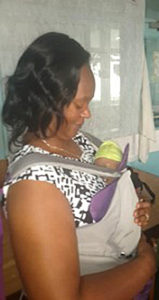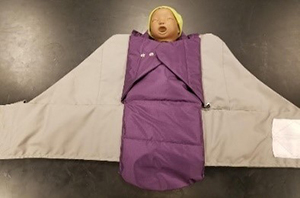An international collaboration aimed at adapting existing technology to reduce infant mortality in Indiana received a two-year grant from Indiana Clinical and Translational Sciences Institute (CTSI) and the Indiana University (IU) Center for Global Health.

Dr. Beth Maina, neonatologist at Pumwani Maternity Hospital, provides feasibility, acceptability, and user design feedback for an initial prototype of the NeoWarm biomedical device during skin-to-skin care mode
Researchers at Indiana University (IU) School of Medicine, Purdue University Weldon School of Biomedical Engineering and Moi University School of Medicine in Kenya will receive up to $50,000 through the Global Health Reciprocal Innovation Demonstration grant program.
The researchers will investigate if NeoWarm and KickSTART technology can be combined to generate new innovations to reduce infant mortality and help opioid-exposed babies. NeoWarm is a wearable biomedical device for premature and low birthweight babies that includes a self-warming pouch and carrier, as well as a system to monitor vital signs and alert caregivers if the newborn’s body temperature fluctuates from a normal range. KickSTART is smartwatch technology originally developed to continuously monitor vital signs and detect overdose among adult opioid users.
“A disproportionate amount of infant mortality, globally, occurs during the newborn period,” said Sherri Bucher, PhD, associate research professor of pediatrics at IU School of Medicine and lead principal investigator for the project. “Innovations that can lessen the complications from underlying causes of newborn mortality, such as premature birth and prenatal drug exposure, also have high potential impact to reduce global rates of infant mortality. Through the collaborative reciprocal innovation process, our work with international partners can identify solutions that work in many different settings.”
Indiana has one of the highest rates of infant mortality in the United States. Indiana also has high rates of opioid-exposed infants, who require complex and expensive neonatal care.
Kangaroo Mother Care (KMC), which utilizes skin-to-skin contact between newborns and their caregivers has shown benefits for premature and low-birthweight babies who are unable to maintain normal body temperature, as well as opioid-exposed babies, especially those suffering from Neonatal Abstinence Syndrome (NAS). Unfortunately, the newborns who might benefit most from these skin-to-skin interventions are often unable to do so because they are tethered to wires required for care and continuous vital signs monitoring. Caregivers are often apprehensive about safely engaging in skin-to-skin care with their small or medically fragile infant. The NeoWarm is designed overcome some of these barriers, and encourage the adoption of skin-to-skin care.
Jacqueline Linnes, PhD, assistant professor of biomedical engineering at Purdue University is the co-principal investigator on the project. The algorithms created by the Linnes Lab for the KickSTART technology could allow for more accurate wireless monitoring of crucial newborn vital signs during KMC while simultaneously providing data about the health outcomes related to these skin-to-skin interventions.

The NeoWarm biomedical device in “stand-alone” mode. KickSTART technology will provide continuous vital signs monitoring of the newborn during all modes of use.
“This grant will allow us to collaborate on the development of a low-cost, wearable, sensor-enabled biomedical device that could enable skin-to skin care and improve the ability of adult caregivers, including parents and health workers in high, low and middle-income countries to continuously and unobtrusively monitor infant health,” said Linnes.
Reciprocal innovation is a process developed at IU that builds on the concept of “reverse innovation.” In healthcare settings, reverse innovation refers to innovations and technologies designed and tested in under-resourced countries that are brought back to developed countries such as the United States to address important health challenges. These innovations are often cost-effective; easy to replicate, scale, and sustain; require minimal infrastructure; and can be tailored to local needs. However, reverse innovation is frequently seen as a one directional process with limited benefit to the under-resourced communities where the technology or innovation is developed.
Reciprocal innovation evolves this concept to create a two-way research agenda that provides mutual benefit to both sides and identifies high quality innovations from global health partnerships for demonstration, replication, and dissemination through a statewide system in Indiana and at partner sites globally.
During the development of the prototype for NeoWarm, Bucher has worked with stakeholders in sub-Saharan Africa, Asia, and Latin America, and holds patents from the U.S. and Nigeria with other international patents pending. User feedback and device refinement suggestions from African colleagues included functions for additional vital sign monitoring.
Late last year, the Indiana CTSI and IU Center for Global Health identified key priority health challenges that would benefit from the reciprocal innovation process. These included infant mortality, substance abuse disorders, and access to healthcare, which are all addressed through this project.
Specifically the grant will fund:
- Adaptation of existing wearable sensor technology to capture data specific to newborn vital signs
- Preliminary safety and engineering validation data
- Feasibility and acceptability assessments among IU School of Medicine and IU Health providers for potential use among opioid-exposed babies
- Implementation of a strategic plan for dissemination of strong research products
Bucher leads the NeoInnovate Collaborative Consortium and is the U.S.-based co-principal investigator for the Kenya site of the Global Network for Women’s and Children’s Research. She is also a co-investigator with AMPATH and Helping Babies Survive (HBS). She is a certified international master trainer and mentor for HBS on behalf of the American Academy of Pediatrics as well as an adjunct associate professional specialist at the Eck Institute for Global Health at the University of Notre Dame.
The Indiana CTSI and IU Center for Global Health have previously funded 23 global health pilot grants for a total of $420,000 to develop reciprocal innovation efforts. Bucher’s NeoWarm efforts received a pilot grant in 2016.
The Indiana CTSI unites a collaborative team of faculty and staff from across partner institutions at Indiana University, Purdue University and the University of Notre Dame to work together to improve health statewide. This project was funded, in part, with support from the Indiana CTSI funded, in part, by grant number UL1TR002529 from the National Institutes of Health, National Center for Advancing Translational Sciences, Clinical and Translational Sciences Award.
